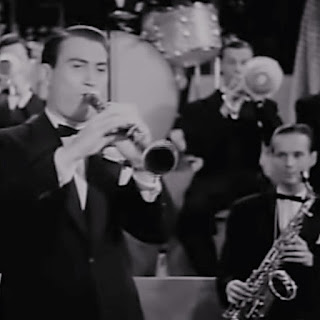The classic song, "Begin The Beguine", is one of the most famous and popular recordings of the Big Band Era. It was originally written by Cole Porter in 1935 while aboard an ocean liner. Such a weird place to write a song. On a cruise in the Pacific.
So what is a Beguine anyway? A Beguine is a dance and music form, similar to a slow rumba.
The song was first introduced to the public later in 1935 by June Knight in the Broadway musical, "Jubilee". Xavier Cugat recorded one of the first versions of "Begin The Beguine" with a much stronger Latin sound than later versions. It was recorded as an instrumental track, although Cugat's vocalist, Don Reid, sang the title at the beginning and the end of the song. But the song gained little popularity.
In 1938, "Begin the Beguine" was recorded by Artie Shaw and His Orchestra. Shaw and his lead arranger Jerry Gray, had put together an extended swing version of the tune which gave it a whole new "feel". Their version was an instrumental as well and was released as a B-Side of another Shaw song, "Indian Love Call". "Begin the Beguine" later became one of the best-selling records in 1938, peaking at Number 3, and it launched Artie Shaw and his band to a new level of fame and popularity.
The instrumental version of "Begin the Beguine" was covered by all of the major bands of the era including: Harry James, Benny Goodman, Tommy Dorsey and Glenn Miller. Frank Sinatra and Ella Fitzgerald were among the vocalists that recorded versions of the song that included the original lyrics.
Listen to: "Begin The Beguine" by Artie Shaw and His Orchestra.
Consider supporting Swing City Radio by becoming a Hepcat. Learn more at: SupportSwing.com.





